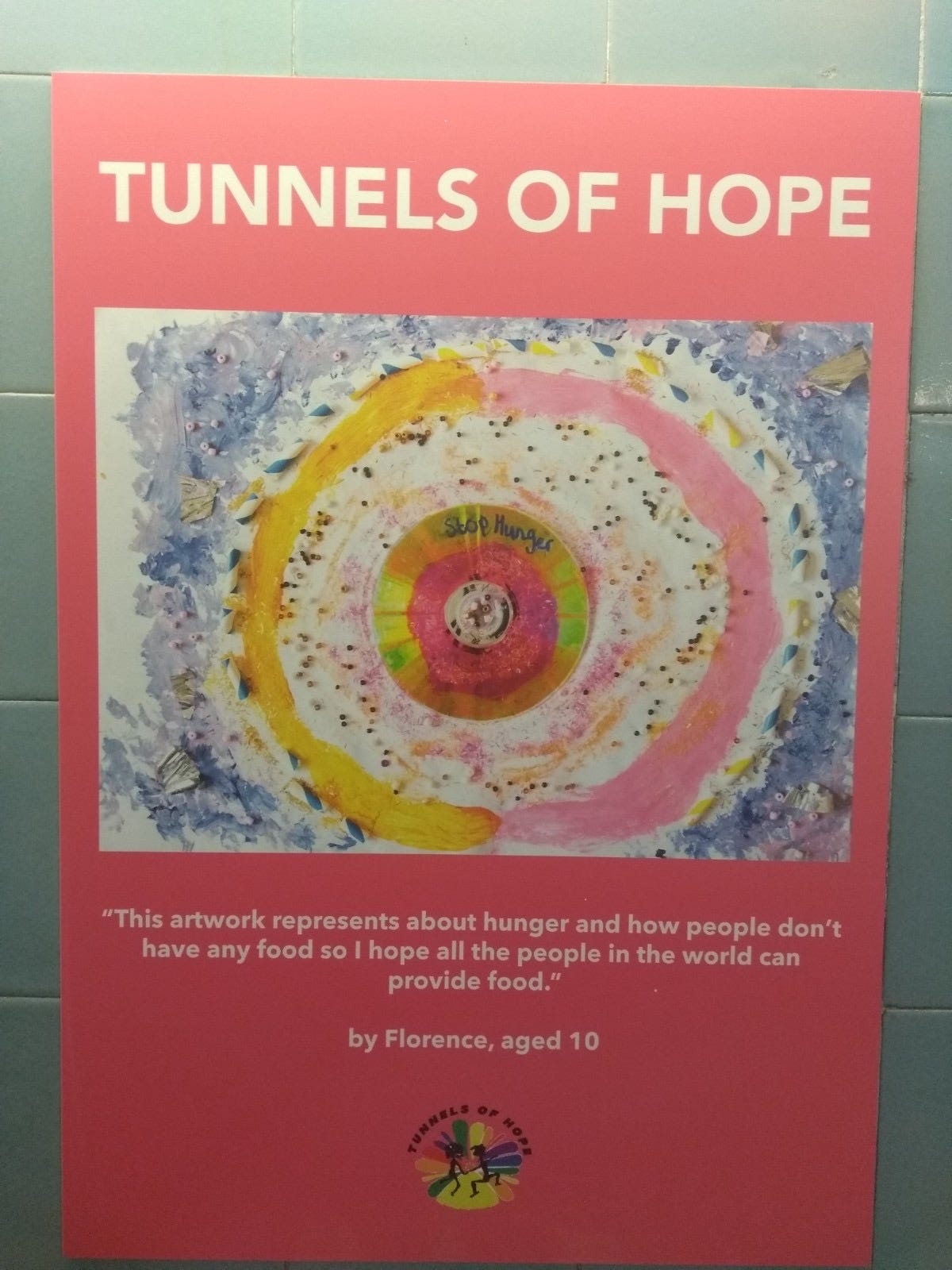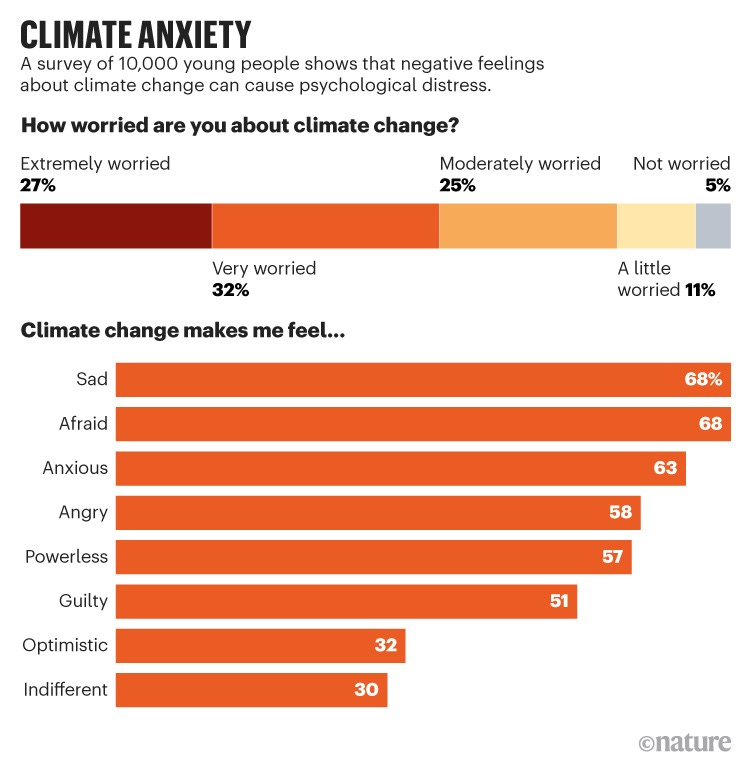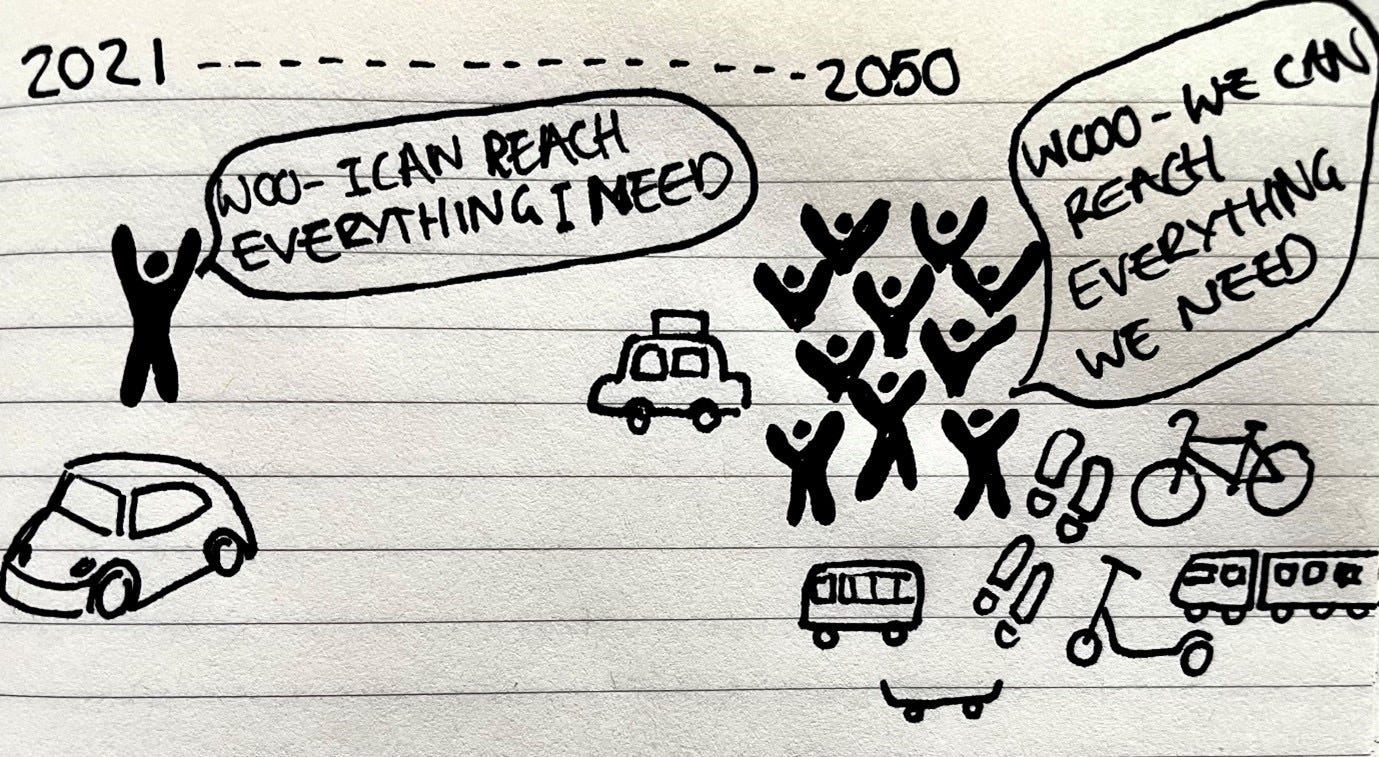28 September 2021. Climate | Cars
Research says that young people are suffering from eco-anxity; imagining a world with fewer cars.
Welcome to Just Two Things, which I try to publish daily, five days a week. (For the next few weeks this might be four days a week while I do a course: we’ll see how it goes). Some links may also appear on my blog from time to time. Links to the main articles are in cross-heads as well as the story.
#1: Young people are suffering from ‘eco-anxiety’
(A poster from the Hammersmith ‘Tunnels of Hope’ project, launched last week. Photo, Andrew Curry, CC BY-NC-SA 4.0)
I think we already suspected that the existential threat of climate change was causing anxiety among young people, but it is good to have some evidence.
Nature asked 10,000 young people, aged 16-25, in 10 countries, what they thought about climate change. It turns out that ‘eco-anxiety’ is a real phenomena:
The results, released in a preprint on 14 September1, found that most respondents were concerned about climate change, with nearly 60% saying they felt ‘very worried’ or ‘extremely worried’. Many associated negative emotions with climate change — the most commonly chosen were ‘sad’, ‘afraid’, ‘anxious’, ‘angry’ and ‘powerless’ (see ‘Climate anxiety’). Overall, 45% of participants said their feelings about climate change impacted their daily lives.
At a national level, it turns out that concerns about climate change tend to correlate with experience of it, and that those concerns are higher in poorer countries. (The notion that concern about climate change is a preserve of richer countries has been refuted in every international survey I’ve ever seen, going back over 15 years or so now.)
The countries with the highest proportion of respondents who felt ‘very worried’ or ‘extremely worried’ by climate change were the Philippines (84%), India (68%) and Brazil (67%), nations that have been hard-hit by climate change. Portugal — where wildfires are becoming increasingly severe — had the highest level of very worried or extremely worried respondents (65%) out of the high-income countries surveyed, which included France, Finland, Australia and the United States.
There’s also an interesting finding about being heard—or not—in conversations about climate change. Four fifths of respondents had had conversations about climate change: half felt they were ignored:
“There is a general ‘othering’ of children in society, and children’s voices that threaten the predominant narrative of the most powerful group in society,” says study co-author Caroline Hickman, a climate-psychology researcher at the University of Bath, UK. Until now, there has been little research on the psychological impacts of climate change on children, she adds.
The young people are generally sceptical that governments are doing enough—“65% of respondents agreed with the statement that governments are failing young people”—but were reassured when governments did act.
One impact of surveys such as this might be to influence the outcome of legal cases about injury caused by the failure to act on climate change, according to American researcher Susan Ray:
“If the research can help hold government bodies accountable … that would be extraordinary. It would give a voice to children most vulnerable, and eco-anxiety can become less about ‘snowflakes’ in privileged settings worrying about polar bears — which is how detractors see it,” she says.
#2: Imagining a world with fewer cars
I think it was the American comedian Bill Hicks who used to do a routine about the dominance of cars on the planet. (I say, ‘I think’ because I have completely failed to find such a sketch online).
But from memory, the way it went was this: if there are aliens watching us they will be convinced that cars are the dominant species, but because all of the moment you see from the air is the billions of vehicles moving around—or sitting around.
I mention this because my transport futures colleague Anna Rothnie has a piece at Greener Transport Solutions on... the problem of cars.
Few things astound me more than the fact that there are approximately 1.4bn cars in the world. That’s 1.4bn 1.5-ton machines made of metal, plastic, rubber, 99% of which are still fuelled by petrol or diesel. With approximately 5 seats per car there is enough capacity to carry around 7.5bn people. The global human population is 7.9bn. Theoretically we’d only need another 80 million cars to take every human on earth on a road trip at the same time.
Of course, the rhetoric around car ownership claims that it represents some kind of transport democracy. In practice, a significant proportion of the population, even in the UK, have no access to a private car:
Whilst there are 32 million cars in the UK, approximately 19% of people have no existing access to a car or a van. On closer inspection this seems to be an indication of a system that incites inequality and primarily benefits white people who are “consistently more likely to live in a household with access to a car or van than any other ethnic group”. Only half of the UK population can drive in the first place – consider others who are shut out from the party as they are too young, disabled or no longer able to drive.
Despite the rhetoric in the government’s recent Transport Decarbonisation Plan—basically that nothing about our car-driving lifestyle will change, except for the new battery powered power-train, this probably isn’t the case.
Anna doesn’t mention it in her piece, but an estimated half of the carbon emissions associated with a vehicle happen in the manufacturing and distribution system before it ever rolls off the dealer’s forecourt.
Similarly, half of the air pollution from vehicles comes from tyres and brakes. And there’s still a big question about whether there are enough resources—especially around batteries—to simply replace every current petrol or diesel powered vehcile with an electric one.
(Source: Greener Transport Solutions)
Anna is more interested in the social movement that might be needed to change our view of cars. She takes heart from the history of veganism, founded by six people in 1944:
(N)ow, being a vegan in the UK is becoming increasingly popular – with options in shops and restaurants continually emerging to support this growing market. The challenge set by veganism has inspired me, like so many others, to drastically reduce my meat intake. I dream of a similar movement that inspires people to consider the implications of car ownership and encourages people to go car-free (Car-Freeganism if you like!). I am excited by the prospect of what could be on offer if more people demanded alternatives to owning a car.
j2t#176
If you are enjoying Just Two Things, please do send it on to a friend or colleague.





